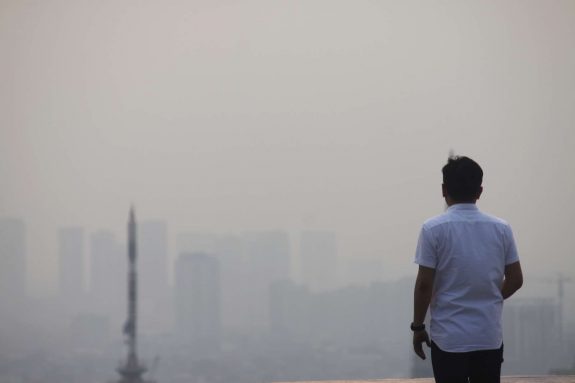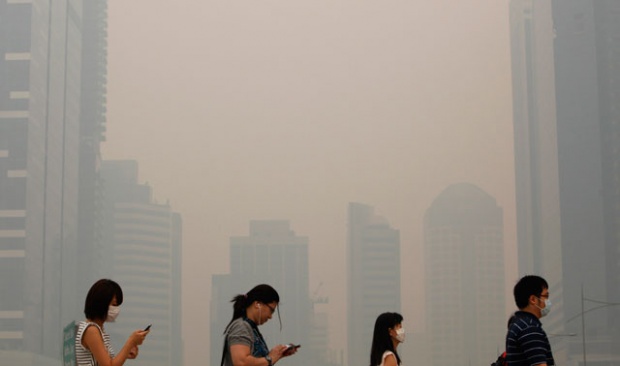The Right to Clean Air in Jakarta

It seems utterly beyond debate but acknowledging legal rights to clean air has assumed the makings of a slow march over the years. The 1956 Clean Air Act in Britain arose from the lethal effects of London’s 1952 killer smog, which is said to have taken some 12,000 lives. The Act granted powers to establish smoke-free zones and subsidise householders to shift to the use of cleaner fuels (gas, electricity, smokeless solid fuel).
There is certainly no shortage of advocates for the self-evident point that clean air is vital. Some of this has been reduced – at least historically – to an issue about the non-smoker’s wish not to have the air clouded by the selfish actions of a smoker. But this is small beer when compared to the general levels of global pollution that keeps the Grim Reaper busy on an annual basis. According to the World Health Organization, air pollution kills 7 million or so people each year, with 9 out of 10 people breathing air “that exceeds WHO guideline limits containing high levels of pollutants, with low- and middle-income countries suffering from the highest exposures.”
In 2019, the UN Special Rapporteur on human rights and the environment David R. Boyd noted approvingly that a majority of States had, be it through their constitutions, statutes and regional treaties, recognised the right to a healthy environment. But recognition for such a right on a global level remained an unfulfilled object. The UN General Assembly, for instance, may have adopted a range of resolutions on the right to clean water, but never on the right to clean air. This is despite such a right being, according to Boyd, “implicit in a number of international human rights instruments, including the Universal Declaration to Human Rights (right to adequate standard of living), the International Covenant on Civil and Political Rights (right to life) and the International Covenant on Economic, Social and Cultural Rights (right to health).”
This month, a flutter of interest was caused by a ruling in the Central Jakarta District Court on a lawsuit lodged two years before accusing the Indonesian government of unlawfully permitting air pollution in the capital to exceed permissible, healthy limits. Citizens such as Istu Prayogi, who had never so much as touched a cigarette in their lives, joined the suit after his lungs revealed the sort of lung damage that would arise from being a heroic, persistent smoker.
The unanimous decision by the three-judge panel found that the seven officials concerned, including President Joko Widodo, three cabinet ministers and the governors of Jakarta, Banten and West Java were negligent in not upholding environmental standards. As Duta Baskara, one of the panel members observed, “They have been negligent in fulfilling the rights of citizens to a good and healthy environment.” The judges, however, dismissed the applicants’ submission claiming that the president had violated human rights.
The court directed that the seven officials take serious action to guarantee the rights of Jakarta’s residents by improving air-quality regulations and implementing measures to protect human health, the environment and ecosystems informed by science and technology. Environmental laws would also have to be policed more rigorously, along with the imposition of sanctions for offenders.

Photo from en.tempo.co
The scale of this effort is hard to exaggerate. On June 4, 2019, Jakarta registered the worst air quality in the world, if one takes the readings of the air quality monitoring app AirVisual as accurate. At 210 on the Air Quality Index (AQI), the city keeps ahead of the pack of other polluters such as New Delhi, Beijing and Dubai.
Rapporteur Boyd also offered his services to the 32 applicants, writing in his supporting brief that, “Protecting human rights from the harmful effects of air pollution is a constitutional and legislative obligation for governments in Indonesia, not an option.” The director of the Indonesian Forum for the Environment, Nur Hidayati, affirmed this view to The Jakarta Post in early June that breathing “clean air is our right that the government has to fulfil.”
These are not positions plucked out of some speculative realm of legal reasoning. The right to clean air in Indonesia is guaranteed by such legal documents as the country’s 1945 Constitution and the 1999 Law on Environmental Protection and Management. But the writ of law is not always a guarantee of its policing.
Before the September decision, Jakarta’s governor, Anies Baswedan, did not feel that a ruling against the authorities would cause much fuss. As the governor’s climate change envoy Irvan Pulunga explained, “The governor doesn’t see this lawsuit as a disturbance to the government’s work but a vehicle for collaboration.” Pulungan also insisted that improvements had been made to the city’s air quality over the course of two years.
This tune coming from the office of president has been somewhat different, more a case of fleeing rather than addressing a problem. In part, this is understandable, given that Jakarta has become a city of nightmares for policy makers, urban planners and the authorities. Few such concentrations of humanity on the planet are as plagued by environmental concerns. To debilitating air pollution can be added flooding, regular seismic activity and gradual subsidence.
Only a month after the lawsuit was filed, the president proposed relocating the capital to another spot to be built in East Kalimantan on the island of Borneo. “The burden Jakarta is holding right now,” he claimed at the time, “is too heavy as the centre of governance, business, finance, trade and services.” Such moves promise to abandon one problem by creating another, given the risks posed to the environment of East Kalimantan.
Showing a spirit not exactly collaborative in nature, an appeal against the ruling is expected by the government. Jakarta’s governor, in particular, finds himself facing a range of orders from the court, including designing environmental “strategies” and policies to mitigate the air pollution” under the direction of the supervision of the Home Affairs Minister.
Modest as it is, the victory for the applicants in the Central Jakarta District Court shows, at the very least, that that courts remain an increasingly important forum to force the hand of legislatures in ensuring that something so elementarily vital is not just seen as a right but enforced as one.
Like what we do at The AIMN?
You’ll like it even more knowing that your donation will help us to keep up the good fight.
Chuck in a few bucks and see just how far it goes!










4 comments
Login here Register here-
guest -
Consume Less -
Mark -
Michael Taylor
Return to home pageIt is interesting that judges in Indonesia should direct that political people and governors, including the President, should take action over air pollution.
In the Netherlands, a judge ordered Shell oil to cut its CO2 emissions by 45% by 2030. The judge said that Shell’s climate policy was ‘not concrete and is full of contradictions…that’s not good enough.’
Investors in Chevron and also Exxon oil have told the companies to reduce emissions.
Here in Australia the Environment Minister Sussan Ley is submitting an appeal against a judge who has supported a claim against the extension of Whitehaven Coal’s Vickery Mine. The claim is in regard to duty of care.
In her article (18/9/2021), “Judges have no place in deciding climate policy,” Janet Albrechtsen supports Ley and her submission against the decision.
Albrechtsen concludes: “Parliament entrusts and empowers Environmental Ministers to balance important policy considerations involving competing environment, social and economic impacts of the coalmine extension project in the interests of the entire Australian population, not just kids. This means protecting the environment, energy needs, jobs, the benefits of trade, the whole caboodle of interests that drive the country’s prosperity and future.”
Let us hope the policies are concrete enough and not full of contradictions
It’s just so awesome how us humans are so good at producing CO2, not to mention all the other toxic vapours we put into the atmosphere. I was surprised to find out recently that Indonesia is also a very big exporter of coal. It just gets better for glow-ball warming.
Re Janet A:
Indeed! And under the Separation of Powers concept, it’s the Judiciary which decides whether that balance has been achieved – or not. Dame Slap would know that.
But for her, any hint of judicial activism is anathema. That’s why she is a Conservative.
Janet A. might have spent too much time listening to Joh.
Now there’s a man with his head around separation of powers.
Not.